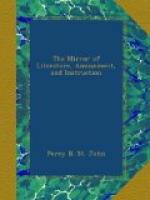Robin Hood was believed to possess supernatural powers. In the parish of Halifax is an immense stone or rock, supposed to be a Druidical monument, there called Robin Hood’s penny-stone, which he is said to have used to pitch with at a mark, for his amusement. There was likewise another of these stones of several tons weight, which the country people would say he threw off an adjoining hill with a spade, as he was digging. At Bitchover, where it was said he lived, among several groups of rocks, were some stones called Robin Hood’s Stride, being two of the highest and most remarkable. He obtained also the distinction of sainthood, in having a festival allotted to him, and solemn games instituted in honour of his memory; a short account of which will be found in The Mirror, No. 544, p. 259. These games were celebrated till the latter end of the sixteenth century, not by the populace only, but by kings and princes, and grave magistrates, in Scotland and in England; being considered in the former country of the highest political importance, and essential to the civil and religious liberties of the people; the efforts of government to suppress them frequently producing tumult and insurrection.
In Ray’s Itineraries, 1760, we are told that Robin Hood’s bow, one of his arrows, his chair, his cap, and one of his slippers, were preserved till within the above century. In Brome’s Travels, is the following notice of his relics: “having pleased ourselves with the antiquities of Nottingham, we took horse and went to visit the well, and ancient chair, of Robin Hood, which is not far from hence, within the Forest of Sherwood. Being placed in the chair, we had a cap which they say was his, very formally put upon our heads, and having performed




